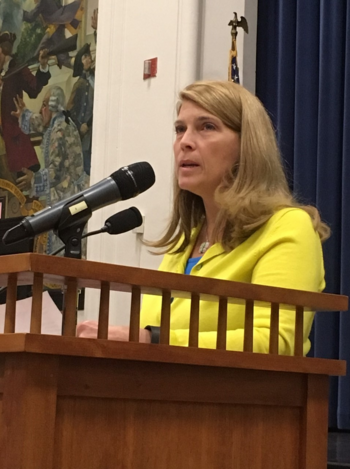First Selectman Jayme Stevenson planned to testify before the Joint Public Health Committee of the state Legislature on Tuesday to oppose a plan to regionalize municipal health departments.
Here’s her prepared statement:
OPPOSE – HB-7170, AN ACT CONCERNING THE DEPARTMENT OF PUBLIC HEALTH’S RECOMMENDATIONS REGARDING THE INTEGRATION OF MUNICIPAL HEALTH DEPARTMENTS INTO REGIONAL HEALTH DISTRICTS
Good Morning Senators Gerratana, Somers, Representative Steinberg and Members of the Public Health Committee. I’m Jayme Stevenson, First Selectman from the Town of Darien and Chairman of Western Connecticut Council of Governments.

Jayme Stevenson
Darien First Selectman Jayme Stevenson
I appreciate the opportunity to comment on HB-7170, which would require local health departments to consolidate into regional health districts along COG boundaries by 2020. I am here today opposing this legislation.
Under the original proposal put forward by the State Department of Public Health, towns would have been required to pay 1.5 percent of their municipal operating budget to fund the regional health district — a proposal which would have cost Darien property taxpayers about $2 million per year over the $296,000 is costs us currently to administer our department.
Although the proposal has been revised to address concerns raised by numerous towns and health directors from across the state, we are concerned that it continues to force towns into a regional delivery model that may undermine the delivery of services in our community and cost more to do so.
While voluntary regional health collaborations in other areas of Connecticut have been successful, I would offer that the voluntary nature of the organizations has been fundamental to their success. I do support voluntary collaborations in all areas of government.
Public health services are vital to maintaining the public’s health, preventing the spread of disease, and promoting lifelong wellness. Local health departments enforce state health laws local regulations, ordinances, sanitary codes, provide frequent inspections of food establishments, salons and residential properties and collaborate with local human service providers.
Public health services are best provided in a setting that fosters a trusting relationship between provider and client. The more dislocated services become from clients, the less effective and timely services become and the likelihood of clients pursuing services diminishes. Bigger isn’t always better.
Darien’s health department is well-positioned to deliver public health services to our residents and businesses in an efficient and cost-effective manner. The department focuses on providing services specific to our community that are important to our residents and local businesses.
Under a large regional health district model, the health service needs of a community the size of Darien may be not be considered a priority and the needs of our residents may go unserved.
At a minimum, residents will have to drive significant distances to access public health services that are now readily available and in close proximity. The needs of Connecticut’s urban centers are significant and different from small towns. This proposal does not address the needs of urban centers and dismantles a system that is both effective and efficient.
Funding for local health districts and departments has been sharply reduced in recent years. Under HB-7170 bill, it is unclear whether any sustained state funding would be available to support the newly created regional health districts.
Instead, it appears that the towns would be on the hook to fund the consolidation, which can be very expensive, and for funding ongoing programs and services that may or may not be needed in our individual communities.
The regional Councils of Government were recently required to consolidate and have spent considerable time and resources in consolidating offices, equipment, staff, etc. Under the proposal, however, they would more than likely have to find larger office space, purchase desks, computers, work stations, phones, etc. to accommodate regional health district personnel.
Space is not available in WestCOG’s current administrative office to house and operate an 18-town public health department. Not only will this be unnecessarily costly, it will prove disruptive to the delivery of public health services.
Connecticut is the 3rd healthiest state in the country, according to the United Health Foundations 2016 rankings — up from 5th in 2015. It’s puzzling why the State Department of Health continues to move forward with this proposal. No evidence has been provided to support the idea that consolidating health districts into 9 larger regional districts will improve the public health of Connecticut residents in any way.
Moreover, under the proposal, municipal officials have no role in appointing the Executive Board or the regional health director or in determining the priorities of the health district. We cannot ensure that our residents have access to quality public health services if we have no role in setting budgets and priorities.
If there are disparities in health outcomes, as asserted by the department, we should have a meaningful conversation about how to address those disparities. However, as proposed, HB-7170 will only serve to undermine the delivery of public health services in small towns such as Darien, significantly increase costs for our property taxpayers, and eliminate the role of municipalities in setting priorities for meeting the public health needs of our local residents.
With the current fiscal condition of the state, this is not the time to impose greater burden on local taxpayers without strong proof of merit.
I strongly advocate for an impact analysis detailing proposed cost savings and service delivery impacts to all affected constituents for this and all proposals to mandate regional consolidations and service delivery.

